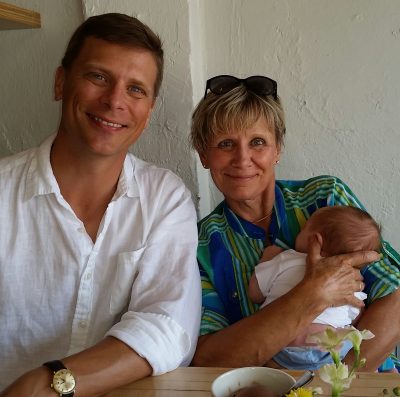Five Questions with Penny Slade-Sawyer
Penny Slade-Sawyer loves public health, whether she’s crafting national policy or leading a walk around the block.
Name: Penny Slade-Sawyer
Position: Senior consultant for the Culture of Health initiative
Time at UNC Gillings: Two years

Penny (at right) enjoys the company of one of her sons, Logan III, and her grandson, Logan IV.
What I do at the Gillings School (and why I love it): The Robert Wood Johnson Foundation (RWJF) has spread the idea that improving the health status of Americans will require some tweaking of our national culture. They coined the phrase “Culture of Health” to represent this idea. Dean Rimer thinks this concept has merit and instituted and supports a Culture of Health at UNC Gillings. With this initiative, we’re trying to do within our School what RWJF is doing nationally – changing the environment to make it easier to make healthy choices. I think this work is so important. Our faculty, staff and students devote their lives to helping others… but sometimes it may be helpful to remind them to stay healthy!
I really love interacting with members of our School community. Our people are so energetic, smart and just plain interesting. Health promotion and disease prevention has been my life’s work, and it’s a joy for me to return to the “ground floor” and implement the practices I once created policies to support.
I came to the field of public health: by accident! As an undergraduate, I studied physical therapy. In my first job, I did a lot of home health work and was fascinated by my observations that patients often seemed to thrive or decline based on their environment and state of mind. I went back to school to learn more about psychology and ended up earning a Master’s of Social Work. I wanted my work to address both the physical and mental components of well-being, so I took a job in a federal prison doing group and individual therapy as well as physical therapy.
Eventually, I joined the United States Public Health Service. This uniformed service exists to serve the underserved and provide public health assistance in places the private sector usually doesn’t want to go – Indian reservations, prisons and so on. After a while, I moved to Washington, D.C., and served as the executive director of the President’s Council on Fitness, Sports and Nutrition.
Ultimately, I served as deputy assistant secretary for disease prevention and health promotion in the U.S. Department of Health and Human Services (DHHS). That was a very interesting role. When I interviewed for the job, I was told that everyone in the department worked “half days” – that meant from 7 a.m. to 7 p.m.! It was exhausting, but it was exhilarating.
I found that, sometimes, certain health issues aren’t politically popular and you have to balance your ideals with what you can achieve. For example, when we created the Dietary Guidelines for Americans, lobbyists for sugar and salt got involved and part of what we wanted to say was modified in the final version.
As someone who is neither a scientist nor a researcher, my job with DHHS was to navigate the politics and try to convince everyone that the science should always come first. (That’s with the caveat that science always changes! The best we can do when making policy recommendations is go with the best science we have at the time.) What I learned was that each political party tends to support certain public health issues. The way to have the most impact was to put your heart and soul into the issues you had a good chance of moving forward under whatever leadership was in power at the time. Eventually, the leadership would shift, and other issues would move into the spotlight and have a turn.
My proudest achievement was leading the development and publication of the inaugural edition of the Physical Activity Guidelines for Americans in 2008. The science kept telling us that health wasn’t just about what people eat, but also how much they move. I went to the secretary of health and human services three times to advocate for that project. On my third try, he said yes.
Outside of work, I’m passionate about: my dog, Bessie! She’s a British Staffordshire Bull Terrier and a fun machine! All my kids took a gap year between boarding school and college, and one son spent his time studying in England – that’s where he came across the breed. He adopted a dog that I absolutely fell in love with, so I got my own! Bessie loves everything that moves, both human and beast, and she’s a big fan of visiting the beach and chasing tennis balls.
The most exciting thing I’ve done in the past year: is visit my new grandson, Logan IV. I have three sons who live in Georgia, Florida and Texas. I try to see one of them every three months. They have their own tradition, too – for more than 10 years now, every July 4 has been linked with “Brother’s Weekend.” The three of them take a trip together, and I’m usually not allowed to know where they go!
If I could wake up tomorrow with one new ability: I’d have a hard time choosing, because there are so many things I’d love to do! I’d enjoy being a landscape architect, for one. I love flowers, I love to grow things, and I think we need more trees and green spaces in our communities. I’d also want to sing or be a talented ballet dancer. I’ve always had a lot of interests, which can almost be a burden because it’s hard to choose just one path and settle down in life. I can honestly say, though, that I’m happy with where I’ve landed.
